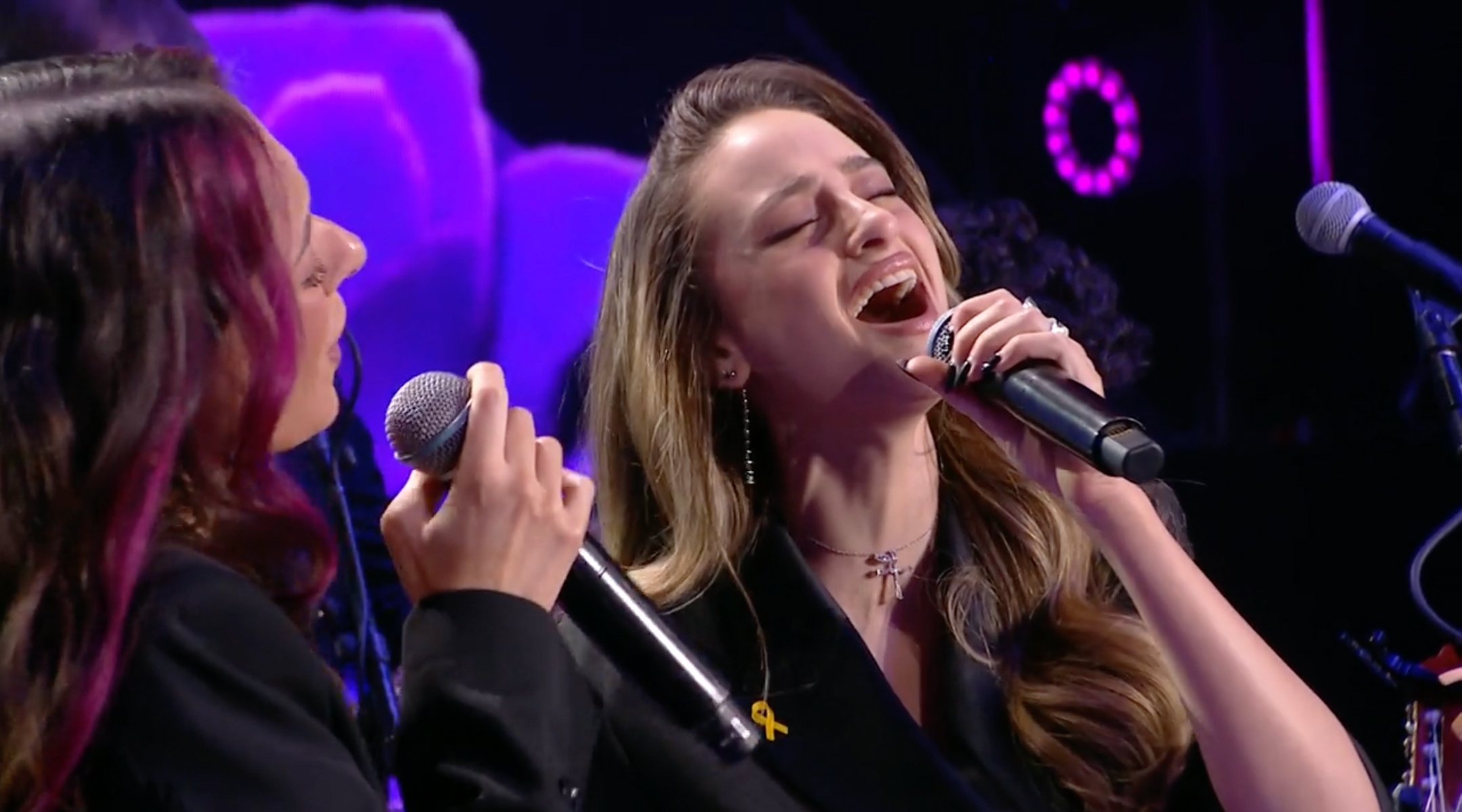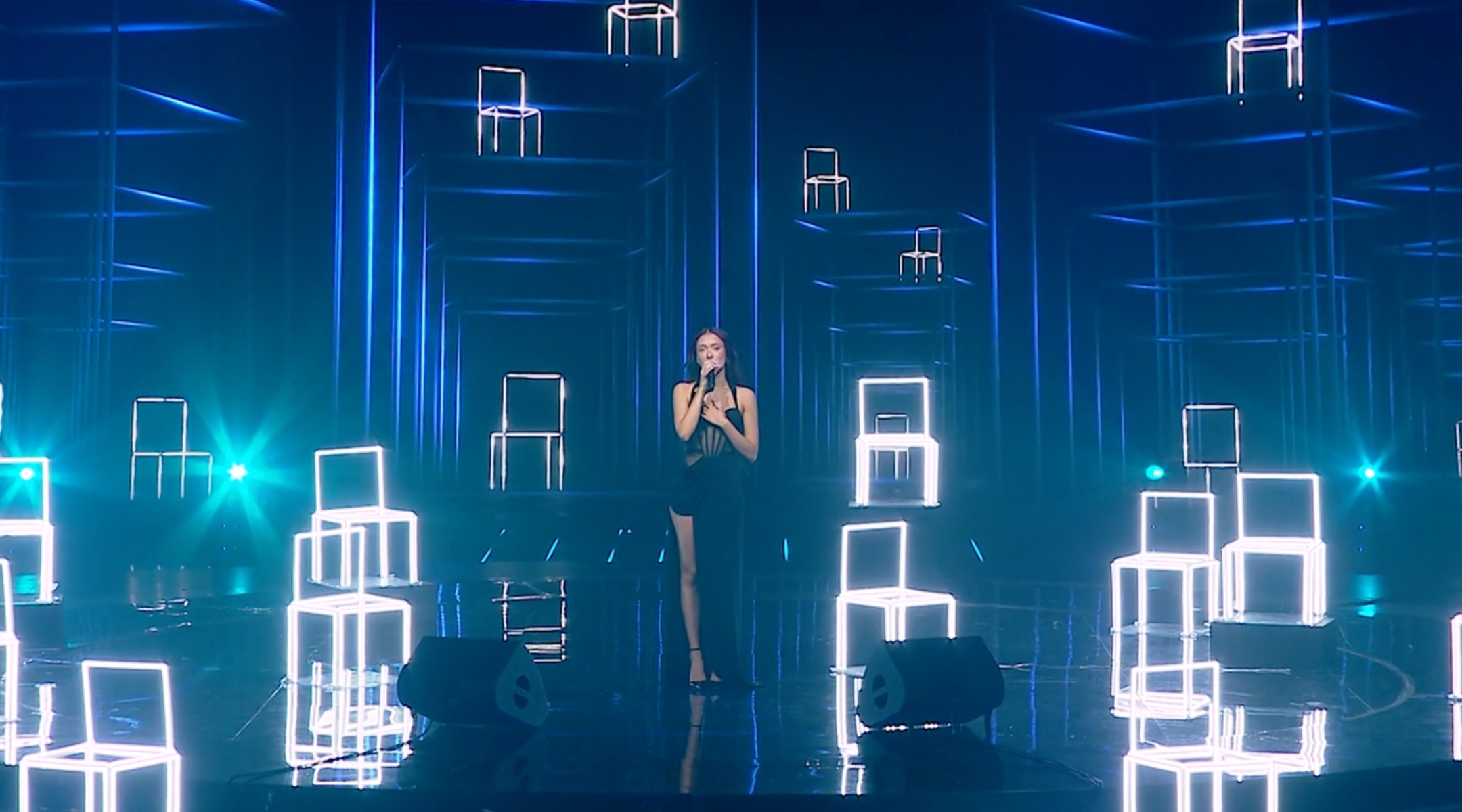(JTA) — Empty chairs representing the Israeli hostages held in Gaza lit up the stage of Israel’s “Rising Star” song competition show Tuesday night as 20-year-old Eden Golan, wearing a yellow ribbon pin, sang Aerosmith’s “I Don’t Want to Miss a Thing” — an emotional grand finale for the country’s auditions to the Eurovision Song Contest, which were postponed by several months due to the war.
Golan beat out three other finalists to win the Israeli competition this week, guaranteeing her a slot at the international competition in Malmö, Sweden, in May.
There, she’ll compete against at least one other Israeli, Tali Golergant, who will represent Luxembourg in the tiny country’s first Eurovision outing in 31 years. Golergant was born in Israel but raised in Luxembourg.
Golan’s selection comes amid mounting calls to ban Israel from the competition over its war in Gaza grow stronger.
The first call came in December, from Iceland’s Association of Composers and Lyricists. “We all have a duty to take a stand against war and murders of civilians as innocent children,” it said in a statement posted to Facebook. “We always have a choice not to attach our name to such whether we are individuals or institutions of the state.”
Since then, a petition in Iceland has collected around 10,000 signatures calling for Israel’s disqualification from the competition. If the country is allowed to compete, the terms say, Iceland will boycott the event. Iceland will determine its participation after its own national competition in March, local newspapers report.
Petitions calling for Israel’s exclusion from Eurovision have since continued, coming from Denmark, Finland, Norway, and Sweden. (Swedish singer Loreen won the Eurovision Song Contest in 2023 with the song “Tattoo.”)
There is precedent for excluding a country from competition because of current events. In past years, Russia and Belarus have been banned over their governments’ human rights violations and suppression of the free press.
The European Broadcasting Union, which runs Eurovision, said in a statement that it is aligned with other international federations “that have similarly maintained their inclusive stance towards Israeli participants in major competitions at this time,” including in sports.
“Comparisons between wars and conflicts are complex and difficult and, as a non-political media organization, not ours to make,” Noel Curran, the organization’s director general, said in the statement.
“We understand the concerns and deeply held views around the current conflict in the Middle East,” he said, but he added that Eurovision is “not a contest between governments.”
As countries select their contestants, the Eurovision website adds information about each one. The link to further information about Golan, which can be viewed only in Europe, includes a statement discouraging harassment that does not appear on other artists’ video pages.
“We are #UnitedByMusic,” the statement says. “The Eurovision Song Contest celebrates diversity through music. Please keep your comments respectful. We will not tolerate racism, sexism, ableism, homophobia, transphobia, body-shaming or any other derogatory or hostile language. Offensive users will be blocked and reported.”
Eden Golan was born in Israel and moved to Russia when she was 6 years old, returning to Israel with her family in 2022 at the start of the most recent Russia-Ukraine war. In 2015, she participated in the Russian selection for the Junior Eurovision Song Contest.
Golan’s grand finale was not the only song dedicated to the hostages Tuesday night — Noa Kirel, Israel’s 2023 delegate to Eurovision, who was not among this year’s finalists, performed Ofra Haza’s 1983 Eurovision entry “Chai” and wore a yellow corset with the Hebrew word for “life” embroidered in glittery letters.
With the costly war endowing old songs with new significance, contestants Or Cohen and Mika Cohen tapped to the Israeli archives Tuesday for mournful songs about young men lost at war, such as “Pri Ganech,” or “Fruit of Your Garden,” a 1991 memorial song by singer-songwriter Yoni Roa about a mother who sits and waits in her garden for her soldier son who never returns from war, and “Naari Shuva Eli,” Maragalit Tzanani’s 1986 hit “Return to Me, My Boy.” Contestant Dor Shimon sang the Sarit Hadad number “Hayiti Be’gan Eden” — “I was in Heaven.”
Earlier in the competition, Golan sang The Beatles’ “Let it Be” with Christian Arab-Israeli singer Valerie Hamaty, the 2021 runner-up of “Rising Star.”

Eden Golan (left) and Valerie Hamaty (right) perform “Let it Be” on Israel’s “Rising Star” in Jan. 2024. (Screenshot via Mako.co.il)
JTA has documented Jewish history in real-time for over a century. Keep our journalism strong by joining us in supporting independent, award-winning reporting.






